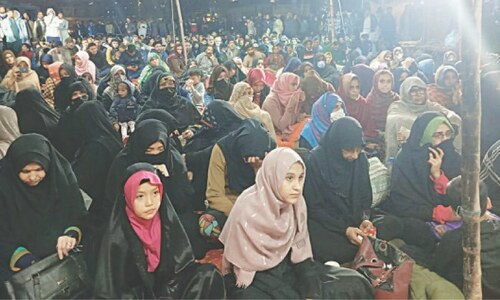KARACHI: Women parliamentarians on Wednesday vowed that they would work hard irrespective of their party affiliations for emancipation of womenfolk especially female agriculture workers in rural swathes of Sindh and the rest of the country.
“Women working in rural areas as agriculture workers are almost enslaved. They are slaves of the slaves and it is our main responsibility to change this equation,” said Nafisa Shah, a member of the National Assembly representing Pakistan Peoples Party while speaking at a consultative seminar.
The event was jointly organised by the National Commission on the Status of Women (NCSW) and the Collective for Social Science Research (CSSR) at a hotel.
She said she had won the recent elections from a Khairpur constituency where a majority of her votes came from women of the area. However, she said that despite making it mandatory for political parties to allot at least five per cent of their tickets to female candidates in the general elections, most parties obliged that condition half-heartedly and most tickets to women were not given on the ‘winnable’ seats.
Ms Shah said the Benazir Income Support Programme was the first effective window that helped poor womenfolk have some reach to the state resources.
On the provincial side, however, she said the Sindh government had made laws for land entitlement for women. Besides, the government in Sindh run by the PPP was also running the Benazir Housing Cell where residential units required women’s titles.
Ms Shah said the agriculture sector was in crisis as a whole in the country, which had forced people historically linked to the sector to migrate to cities since the urban areas offered more resources and capital.
Farmers and peasants were equally indebted with no capital in sight in the rural swathes and most banks did not support them.
“The gender issue, thus, is nowhere in sight when it comes to loans [to] the agriculture sector.”
She said her party was mulling over setting up a Hariyani (women peasant) organisation to create awareness among those women and offer them a forum to unite for their rights.
Mehnaz Akbar, an MNA belonging to the Pakistan Muslim League-Nawaz, who won a Narowal seat in direct election, said women issues should be mainstreamed and gender sensitisation was need of the hour.
She said the non-governmental organisations and research institutions should give their plans to lawmakers for women-oriented legislation for which most parliamentarians would be eager to contribute and get them passed.
She said studies should be launched to assess the quantum of positive effect on women by projects related to the China-Pakistan Economic Corridor.
Tanzeela Sheedi, newly-elected member of the Sindh Assembly belonging to the PPP, said the Sindh government’s focus would be on women emancipation where efforts would be made to ensure women’s entrepreneurship at the lower level.
She said microfinance investments meant to empower women were largely being exploited in their names.
“Our government will ensure that such loans given to women should be used by women for their emancipation.”
Speakers at the programme said in Pakistan, women made up a majority of the agricultural workforce, but their contribution remained unacknowledged in policy and public debates. They said women agricultural workers undertook difficult physical labour, working long hours in unsafe conditions and were paid lower wages compared to their male counterparts. They also had fewer opportunities than men, with unequal access to resources such as land, technologies etc.
The consultation explored possible ways of advancing rights of women agricultural workers. The group included policymakers, practitioners, opinion-makers and members of community organisations. They focused on how policy and legislative reform could improve the rights and well-being of women agricultural workers.
Dr Yasmeen Zaidi, director of the Centre of Gender and Policy Studies (CGaPS), presented findings from the Status of Rural Women in Pakistan Report 2018.
She reported that approximately 53 per cent of women who worked were unpaid and 60pc of those belonged to rural areas.
Haris Gazdar, Pakistan’s lead researcher for Leveraging Agriculture for Nutrition in South Asia (LANSA) and director of CSSR, reported findings from the Women’s Work in Agriculture and Nutrition Survey 2015-16.
The survey found that 63pc of children between 0-3 months were stunted in rural Sindh.
He said that indicated the battle against malnutrition was already lost when the child was born, and the fact was that women’s health, work and well-being should be central to child nutrition.
The report also found that lack of education; household poverty and food insecurity were strongly associated with women’s participation in agricultural work.
Participants then discussed how rights and well-being of women agricultural workers could be prioritised in legislation and policy.
Khawar Mumtaz, director of NCSW, stressed the need to redefine women’s work so all provinces could move towards its official counting and recognition.
Participants also emphasised the need for implementable research that can be easily accessed by policymakers.
Published in Dawn, August 30th, 2018















































Dear visitor, the comments section is undergoing an overhaul and will return soon.